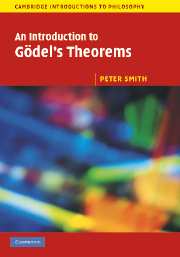Book contents
- Frontmatter
- Contents
- Preface
- 1 What Gödel's Theorems say
- 2 Decidability and enumerability
- 3 Axiomatized formal theories
- 4 Capturing numerical properties
- 5 The truths of arithmetic
- 6 Sufficiently strong arithmetics
- 7 Interlude: Taking stock
- 8 Two formalized arithmetics
- 9 What Q can prove
- 10 First-order Peano Arithmetic
- 11 Primitive recursive functions
- 12 Capturing p.r. functions
- 13 Q is p.r. adequate
- 14 Interlude: A very little about Principia
- 15 The arithmetization of syntax
- 16 PA is incomplete
- 17 Gödel's First Theorem
- 18 Interlude: About the First Theorem
- 19 Strengthening the First Theorem
- 20 The Diagonalization Lemma
- 21 Using the Diagonalization Lemma
- 22 Second-order arithmetics
- 23 Interlude: Incompleteness and Isaacson's conjecture
- 24 Gödel's Second Theorem for PA
- 25 The derivability conditions
- 26 Deriving the derivability conditions
- 27 Reflections
- 28 Interlude: About the Second Theorem
- 29 µ-Recursive functions
- 30 Undecidability and incompleteness
- 31 Turing machines
- 32 Turing machines and recursiveness
- 33 Halting problems
- 34 The Church–Turing Thesis
- 35 Proving the Thesis?
- 36 Looking back
- Further reading
- Bibliography
- Index
6 - Sufficiently strong arithmetics
Published online by Cambridge University Press: 05 June 2012
- Frontmatter
- Contents
- Preface
- 1 What Gödel's Theorems say
- 2 Decidability and enumerability
- 3 Axiomatized formal theories
- 4 Capturing numerical properties
- 5 The truths of arithmetic
- 6 Sufficiently strong arithmetics
- 7 Interlude: Taking stock
- 8 Two formalized arithmetics
- 9 What Q can prove
- 10 First-order Peano Arithmetic
- 11 Primitive recursive functions
- 12 Capturing p.r. functions
- 13 Q is p.r. adequate
- 14 Interlude: A very little about Principia
- 15 The arithmetization of syntax
- 16 PA is incomplete
- 17 Gödel's First Theorem
- 18 Interlude: About the First Theorem
- 19 Strengthening the First Theorem
- 20 The Diagonalization Lemma
- 21 Using the Diagonalization Lemma
- 22 Second-order arithmetics
- 23 Interlude: Incompleteness and Isaacson's conjecture
- 24 Gödel's Second Theorem for PA
- 25 The derivability conditions
- 26 Deriving the derivability conditions
- 27 Reflections
- 28 Interlude: About the Second Theorem
- 29 µ-Recursive functions
- 30 Undecidability and incompleteness
- 31 Turing machines
- 32 Turing machines and recursiveness
- 33 Halting problems
- 34 The Church–Turing Thesis
- 35 Proving the Thesis?
- 36 Looking back
- Further reading
- Bibliography
- Index
Summary
Theorem 5.7, our first shot at an incompleteness theorem, applies to sound theories. But we have already remarked in Section 1.2 that Gödel's arguments show that we don't need to assume soundness to prove incompleteness. In this chapter we see how to argue from consistency to incompleteness.
But if we are going to weaken one assumption (from soundness to mere consistency) we'll need to strengthen another assumption: we'll now consider theories that don't just express enough but which can capture, i.e. prove, enough.
Starting in Chapter 8, we'll begin examining various formal theories of arithmetic ‘from the bottom up’, in the sense of first setting down the axioms of the theories and then exploring what the different theories are capable of proving. For the moment, however, we are continuing to proceed the other way about. In the previous chapter, we considered theories that have sufficiently expressive languages, and so can express what we'd like any arithmetic to be able to express. Now we introduce the companion concept of a sufficiently strong theory, which is one that by definition can prove what we'd like any moderately competent theory of arithmetic to be able to prove about decidable properties of numbers. We then establish some easy but quite deep results about such theories.
The idea of a ‘sufficiently strong’ theory
Suppose that P is some effectively decidable property of numbers, i.e. one for which there is a mechanical procedure for deciding, given a natural number n, whether n has property P or not.
Information
- Type
- Chapter
- Information
- An Introduction to Gödel's Theorems , pp. 43 - 46Publisher: Cambridge University PressPrint publication year: 2007
